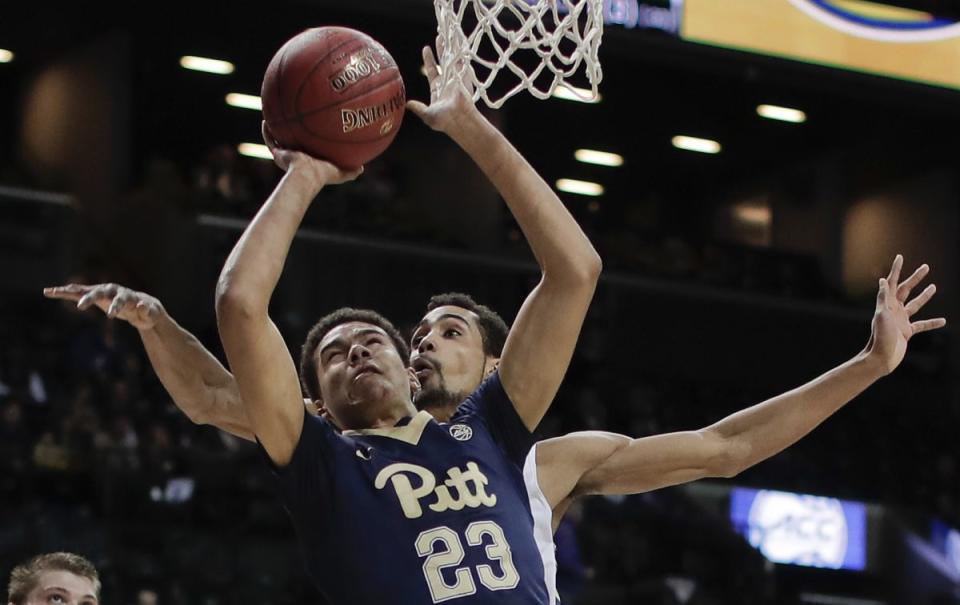Pittsburgh predictably backs down, grants Cameron Johnson a full release

The month-long fight between prized grad transfer Cameron Johnson and his former school ended predictably on Thursday evening.
Pittsburgh backed down under heavy public pressure and at last did the right thing, granting Johnson a full release that enables him to play right away for North Carolina next season.
Graduate transfers typically have the right to play immediately at any school of their choice, but Pittsburgh initially refused to grant Johnson permission to contact any other school in the ACC about a transfer. Going through the appeals process at Pittsburgh gained Johnson an unsatisfactory compromise: He could transfer to a fellow ACC school if he was willing to burn one of his two remaining years of eligibility by sitting out the 2017-18 season.
Johnson received offers from the likes of Kentucky, Arizona, UCLA, Oregon and Ohio State, but mutual interest between him and North Carolina convinced him to challenge the restrictions Pittsburgh had placed on him. He spoke to a handful of media outlets in late May and then released a strongly worded statement Tuesday after committing to the Tar Heels without any guarantee he’d be able to play next season.
In his statement, Jonson said he believes that the Pittsburgh faculty committee that heard his appeal misinterpreted NCAA transfer rules. Transfers typically have to sit out a year before being eligible for competition, but grad transfers are eligible immediately unless they are totally denied from attending a school.
“Having already won the right to ‘immediately receive athletically related financial aid’ from an ACC institution at my appeal hearing, I believe, as does my family’s legal counsel, that I should be immediately eligible at North Carolina,” Johnson wrote.
Other grad transfers from ACC programs have transferred within the league without having to sit out a year, but Pittsburgh at first wouldn’t budge. Unwilling to risk facing Johnson twice a year for the next two years, the Panthers put their own interests above those of a student-athlete who represented the school impeccably the past three years.
Johnson is a two-time member of the ACC All-Academic Men’s Basketball team. He stayed loyal to Pittsburgh despite the school undergoing a coaching change last year and blossomed into one of the Panthers’ best players this past season. Now he’s leaving because Pittsburgh’s roster has been decimated by defections and graduations and he wants to play at a school that has a chance to be competitive the next two years.
In his statement Johnson noted that former coach Jamie Dixon and current coach Kevin Stallings “had the freedom to move as they pleased.”
“As a student-athlete, who is not a paid employee of the school, and a graduate, shouldn’t I be granted the same freedom of movement?” Johnson wrote.
Like most schools who endure a torrent of negative publicity for placing restrictions on a transfer, Pittsburgh backed down once the pressure began to mount. As a result, Johnson will be able to play for North Carolina next season instead of throwing away a year of eligibility.
Having Johnson is critical for a North Carolina program that must replace ACC player of the year Justin Jackson and its top three big men from last year’s national title team.
Johnson averaged 11.9 points, 4.5 rebounds and 2.3 assists as a redshirt sophomore at Pittsburgh and shot 41.5 percent from behind the arc. He’s an ideal replacement for Jackson because he’s capable of playing small forward when the Tar Heels opt for a traditional two-big-man look or power forward if they choose to go smaller out of necessity.
There are two lessons that should emerge from Johnson’s fight with Pittsburgh.
The first is that schools tempted to place restrictions on transfers have nothing to gain. Most back down after getting bashed in the media for weeks. The few who don’t endure months of negative publicity and gain a reputation among potential recruits for being petty, vindictive and inflexible.
The dispute between Johnson and Pittsburgh should also serve as a reminder of a rule change that is long overdue. It’s time to take away the right to place restrictions on transfers from coaches and administrators who often abuse that power.
A coach can jump to any school he wants. Transfers should have that same right too.
– – – – – – –
Jeff Eisenberg is the editor of The Dagger on Yahoo Sports. Have a tip? Email him at daggerblog@yahoo.com or follow him on Twitter!



